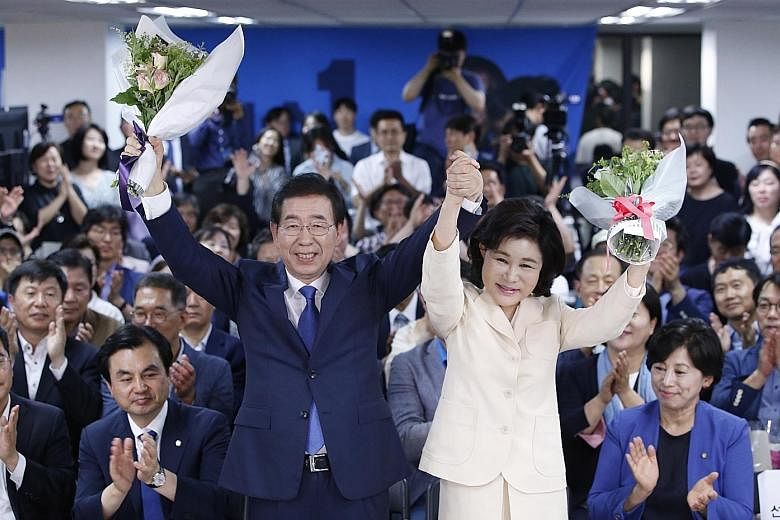SEOUL • The leader of South Korea's main opposition party quit yesterday to take responsibility for its crushing defeat in parliamentary by-elections and local polls.
Mr Hong Joon Pyo, chairman of the conservative Liberty Korea Party (LKP), said he respected the outcome of Wednesday's elections.
"We completely failed and the entire country has been passed (to the ruling party). Everything is my fault and every liability lies with me," Mr Hong said at a party meeting.
"I respect the decision of the voters. I will step down from my chairman position," said Mr Hong, who lost to Mr Moon Jae In in last year's presidential election.
The LKP won only two of the 17 major mayoral and gubernatorial races in the local elections.
In by-elections held on the same day to fill 12 vacant parliamentary seats, the party formerly known a the Grand National Party won only one seat, said the National Election Commission.
Known for his hardline views towards North Korea, Mr Hong wrote on social media following the historic summit between US President Donald Trump and North Korean leader Kim Jong Un that "South Korea's national security is on the edge of a crisis".
Mr Hong, 63, had called Tuesday's summit a "great failure".
South Korea's daily JoongAng Ilbo said the election results are "a reminder that the conservative party has yet to win back the support of disenchanted voters after president Park Geun Hye was impeached and imprisoned on charges of corruption and abuse of power last year".
Analysts told The Korea Herald the damage to the conservative camp may be "irreparable" unless it comes up with sincere measures.
"Regardless of the agenda, the conservative party clashed strongly with the ruling party and the government, and the series of events highlighted the party's reputation as an interest group, not a political representative of the people," Professor Shin Yul, a political science professor at Myongji University, told The Korea Herald.
Professor Yoon Pyeong Joong, a professor of political philosophy at Hanshin University, said: "The Liberty Korea Party should come up with a new policy frame that can compete with the Moon administration's big policies, especially in North Korea policies."
Since President Moon took office in May 2017, the LKP has been opposing government plans - from its appointment of the Cabinet to the efforts to engage North Korea, which generally have been welcomed by the public.
While it may be the role of opposition parties to keep the government in check, the LKP's hardline stance ran against public sentiment and created the impression it was opposing the government for the sake of opposition, Prof Shin said.
The ruling Democratic Party secured 11 out of a total of 12 parliamentary seats and clinched 14 out of 17 major provincial and mayoral seats, delivering a strong mandate to President Moon as he pursues a liberal agenda.
Seoul's Mayor, Mr Park Won Soon, who is from the Democratic Party, retained his post for a record third term - cementing the 62-year-old's status as a top presidential contender after Mr Moon steps down when his single five-year term ends in 2022.

